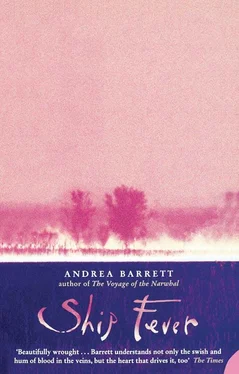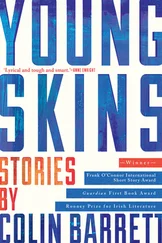But Harry said that the last few years had brought hard times to Couperin as well. He had developed a bone disease that was eating its way through his spine; he was in a wheelchair and his head was held upright by a brace that stretched from his shoulders alongside his ears to end in a metal halo pinned to his skull. One son had died; a daughter was in a drug-rehabilitation clinic. Harry, who was Couperin’s lawyer as well as my father’s, says that when he brought the news of my father’s illness to Couperin, Couperin had first laughed and then cried and finally said, “Look at us two old buzzards — after all these years, the both of us sick and alone.”
Harry, at Couperin’s request, brought my father to Couperin’s house for a reconciliation. It was something, he said: those two old, beaten men, their families lost or scattered, one in a wheelchair and wearing a halo and the other frail and in pain, perched on chairs in front of Couperin’s fireplace and getting drunk on Couperin’s oldest brandy. Harry was there, sitting in the background. He says Couperin said, “What are we saving it for?” He also says the two men talked some about their children.
When Harry told me that I didn’t ask him anything; I suppose I was afraid to know. But later, after I’d slept on that story for a couple of days, I asked him if he could tell me what they’d said.
“I’m your father’s lawyer,” Harry said. “You know the things he told me have to stay private.”
“You weren’t at that conversation as a lawyer,” I said. “Were you? You were there as my father’s friend.”
Harry admitted that this was so, but all he would do was answer me in generalities. Couperin had said something nasty about my father’s daughters, who couldn’t find the time to take care of him, and my father had said that we had visited just recently and that we planned to come back again soon. We were good girls, he said.
“He said that?” I asked Harry. “Did he say anything specific about either of us?” I couldn’t help asking that. Harry gave me a skeptical look. Then he said, “Your father told Couperin that you had a great job and that he was very proud of you.”
“And Bianca?”
“He loved to tell stories about her adventures.”
“Hawaii, you mean? Alaska? The climbing stuff?”
“All that.” All the things I hadn’t done. Harry wouldn’t tell me if my father’s pleasure in Bianca’s adventures outweighed his pride in my accomplishments. Instead, he told me other stories about my father’s friends.
They brought food, some of them — not one of them had a wife left, all their wives had died or abandoned them, but they cooked clumsy meals and brought them to my father. They planted a chaise in the front lawn and on sunny days guided my father out there for some air. They drove him to the doctor. They talked to the nurse. They brought Scotch and wine and sat on the end of my father’s bed, refreshing their drinks and telling bawdy anecdotes from their shared youth. Harry said they made my father laugh.
These stories give me such a pain. Because women had come and gone from our father’s life with some frequency before his second marriage, and because he never seemed to miss any of them any more than he missed us, Bianca and I had labored under the impression that he had no emotional life. And yet this turned out to be untrue. Our father had an emotional life, although it was not one we could recognize. It was centered, while he waited for his wife, on his dogs and on this group of men.
Now, when I see these men in the village, they are quite cool to me. They judge me harshly, and rightly so, for not sharing my father’s last days. But everyone else treats me as if nothing has happened. In the high school there are still a few teachers left from the time when Bianca and I were students: Mrs. Komnetz, who teaches English; Mr. Baker, who teaches biology. And of course there are plenty of other people in town who remember me and Bianca as girls. When I first moved back here, and even more when I first got my job, I wondered all the time what these people thought of me. They remember me and Bianca, but they remember us as if we were different people.
“You were such bright girls,” Mrs. Komnetz says. “So spunky, so talented. We all knew you had a future. What is your sister doing these days?”
“Painting,” I say, although Bianca is not painting but only living with a painter. But everyone accepts this, as if we are only doing what they expected. They’re a little surprised to find me back here, but happily surprised, pleased. They have no knowledge of anything Bianca and I did after we left this town, and what they remember of our girlhood here is sanitized and wrapped in a shroud of nostalgia. No one mentions the times we were suspended from school, the endless notes sent home to our father, the policemen showing up at our house at night after certain acts of vandalism that pointed unfailingly to us. In their revision of our history, we are local girls who made good. They act as if they’re grateful that I came back, and they are so tactful they never ask if I mind the cut in salary or if I miss being called “Professor” or “Doctor” instead of plain “Ms. Marburg.”
Of our visit to our father before his death, they remember that we came and cooked and cleaned; they forget that we left. Of the funeral, what they seem to remember is two young women struck speechless by loss. No one knows that we slept on that hill; no one wonders, or not out loud, why we were never seen with our father’s widow. If they remember anything strange about that time, they tend to blame it on her. She was not a local woman.
Instead of talking about those things, they tell me stories about our grandfather and our great-aunts as if they were still alive. “You look like Agnes,” they say to me, or “Did you know you have Leo’s nose?” They’ve forgiven or forgotten everything, especially now that I live with Harry and his white dog.
This dog and I share a secret: our pasts are lost to everyone but us. I remember who I was as a girl, but everyone seems to have entered into a conspiracy to deny that that girl was me, as they deny their knowledge of what I did while my father was dying. As for the dog — who knows what the dog remembers? People treat him like Harry’s dog: ancient, arthritic, harmless. I think he remembers each of my father’s last days.
Since my arrival, this dog has attached himself to me. He sleeps on the floor beside me, within reach of my dangling arm. When I’m absent he pulls my dirty clothes from the hamper and gathers them patiently into a heap, on which he turns and turns and turns before flopping down. At night, when I sit grading my students’ exams in the room that Harry has turned into my study, the dog lies groaning and scratching the floor as he dreams his way through our past. If I wake him up too suddenly, he jerks stiffly to his feet and then barks at the portrait of Suky, which turned up at a flea market in Ithaca after I thought it was lost forever. If dogs could talk, I believe this one could list each moment where I failed.
What am I to make of all this? I’ve tried to describe much of it in my letters to Bianca — always leaving out the most important part, which is that I’ve shared our deepest secret with Harry. Bianca suspects this, I believe; she didn’t reply the first two times I wrote. But a month ago, after I wrote describing Couperin’s involvement in our father’s last days, and the recovery of our father’s dog, she wrote back to me.
“Why are you telling me these things?” she wrote. “I bet you don’t remember Couperin any better than I do. But I’m glad you have Dad’s dog and that he’s all right. Are you happy with this Harry? Please tell me you’re not with him because of that dog.”
Читать дальше
Конец ознакомительного отрывка
Купить книгу












